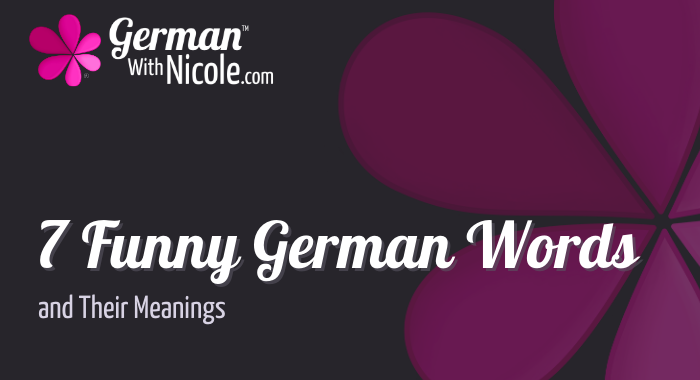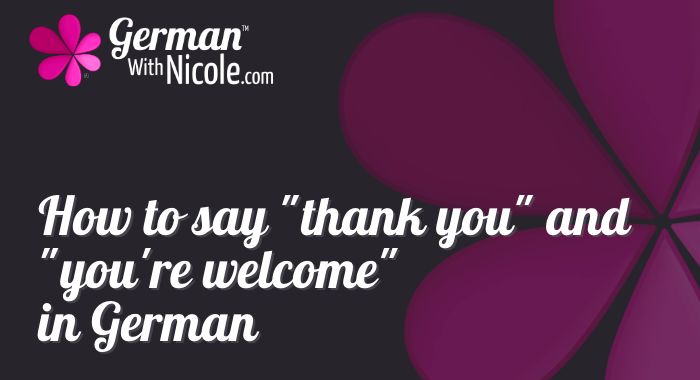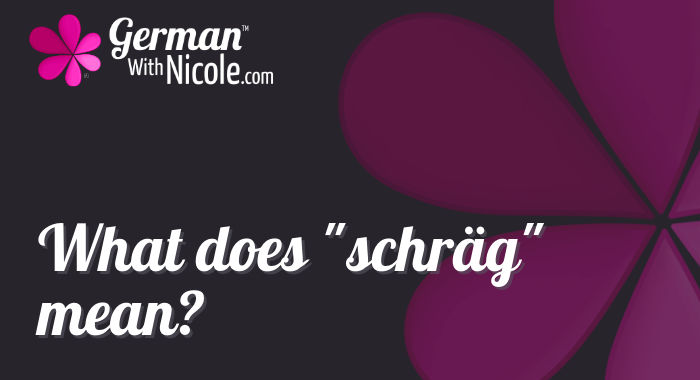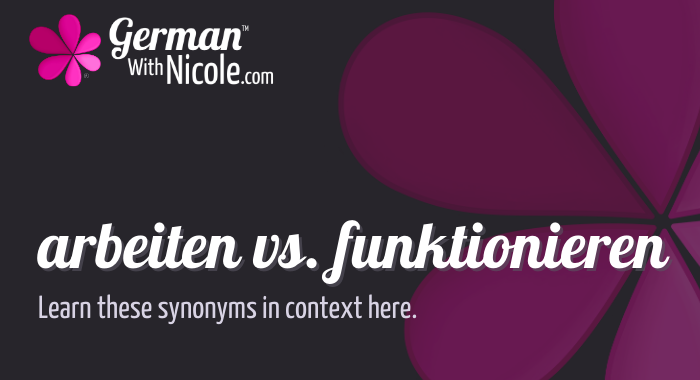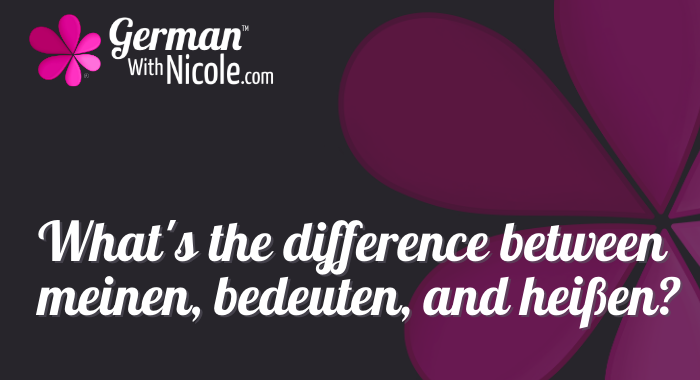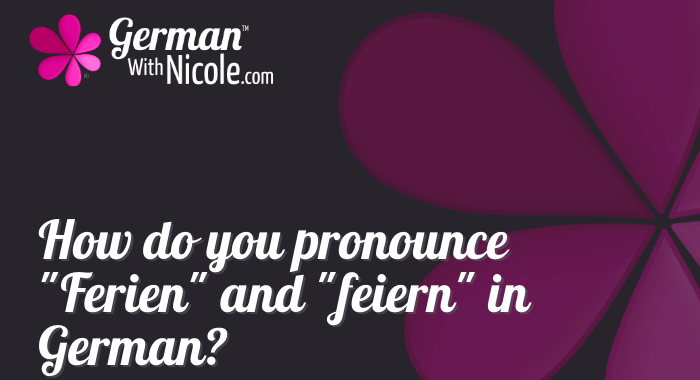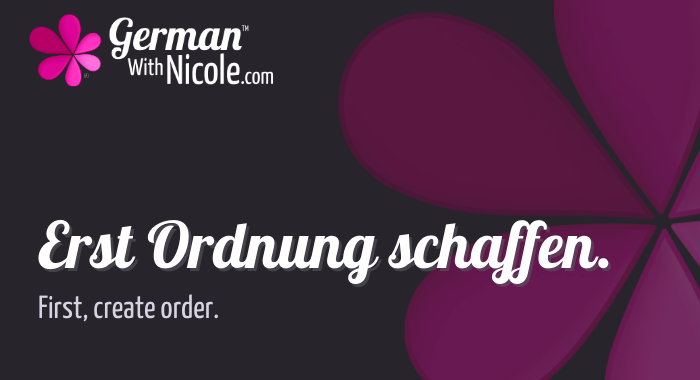das Blog
Vokabeln
7 Funny German Words and Their Meanings
There are so many funny words in German and sometimes their meanings are straight-forward, sometimes they are words we might wish we had as English speakers!
Here are 7 funny German words, including two funny German words for animals (real or imagined?!), with slow pronunciation and the meanings of the words.
This episode is great for learners at the A1, A2, and B1 levels.
die Vokabeln:
Nummer
|
Deutsch |
Englisch |
|
1 |
der Kummerspeck das Hüftgold |
love handl… |
What is the Best Way to Learn German vocabulary?
Yes, German vocabulary learning is the featured topic right now because the most important part of learning German is learning how to learn it.
Vocabulary learning is a HUGE part of that!
This is what you'll hear in this episode:
-
A realization a client of mine had about learning.
-
The answer to: should you use pencil and paper or an app?
-
Three ideas to put fresh wind in your sails for vocab learning.
-
Me getting up on my soap box about "the end-all, be-all method of lea…
5 Myths on How to Learn German Vocabulary-Busted!
A lot of what you might read on the internet on how to learn German vocabulary words is really a lot of hot air & hooey.
In this episode we'll bust 5 myths on vocabulary learning and give you a clearer picture of why vocabulary learning is important.
After all, if you don't know what the words mean...you'll be up a creek without a paddle.
The 5 Myths:
-
You only need to learn 3,000 words to truly speak German!
-
Vocabulary isn't as important as grammar.
-
Learning vocabulary is as bo…
7 Holiday Greetings in German, from Hanukkah through Christmas and into the New Year
Holidays mean greetings.
In Germany that means many holiday greetings. For different people.
When do you say what to whom?
Learn in this episode of the GermanWithNicole.com Podcast:
-
How to wish someone a nice Advent in German
-
How to say Happy Hannukah in German
-
How to say Good Yule in German
-
How to say Happy Holidays in German
-
How to say Merry Christmas in German
-
How to say Happy New Year in German
-
and a couple more.
AND you'll learn when to say which g…
How to say "thank you" and "you're welcome" in German
Learning to say thank you and you're welcome in German is really important, as it's part of good manners in German culture and it's also really easy to learn.
Danke. = Thank you.
Bitte. = You're welcome.
But do you hesitate to say them?
I used to hesitate, too, until I attended a soccer game (Schalke 04 - Glück auf!) and the crowd taught me the importance of "Danke" and "Bitte."
Ein Fußballspiel, eine Bratwurst, danke und bitte.
Los geht's!
N.B. The A1-A2-B1 German Sentence Structure…
What does "schräg" mean?
You probably enjoy those lists of German words that can't be translated into English as much as I do.
They go around the internet again and again, but have you noticed they're usually the same words?
This word, schräg, never shows up on one, and it deserves to be on every list.
In this episode you'll learn all about the word schräg.
You'll learn what it means, how to pronounce it, and how to use the word schräg.
Und machen Sie Ihre Hausaufgaben! (Do your German homework.)
N.B. The A1-…
arbeiten versus funktioneren
When should you use 'arbeiten' and when should you use 'funktionieren'?
All the answers are in this episode!
You'll learn these two verbs in the context of wine harvest, too, because it's wine harvest time.
Learning to differentiate synonyms in German works really well when you use context.
This way you can easily build a picture in your mind that will help you for all of your German learning.
If it helps, you can even draw yourself a little sketch of a scene you'll hear in this episode.
A…
What's the difference between meinen, bedeuten, and heißen?
Synonyms in German function differently--they overlap differently--than in English.
Well, of course they do, right? Because it's a different language.
A lot of German learners - A1, A2 and B1-level learners confuse the verbs meinen, bedeuten, and heißen because in English they all mean "to mean."
bedeuten = to mean
heißen = to mean (also means "to be called," which you'll hear as well today)
meinen = to mean
UGH!
The good news is, there are ways to tell them apart and you'll learn them in…
How do you pronounce "Ferien" and "feiern" in German?
Summer vacation (or summer holidays) are drawing to a close for loads of people in the northern hemisphere.
So what are these called in German?
Das sind die Ferien.
And why is that word so frequently confused with "feiern"?
Because they are so similar.
In this episode of the GermanWithNicole.com podcast you'll learn how to pronounce these two words, which article you should use with Ferien (it's simpler than you might think), and a couple of example sentences so you can remember which word …
Erst Ordnung schaffen - First Create Order
«Erst Ordnung schaffen.»
the stylist proclaimed as she clipped a section of my hair to the side and combed the section she was about to cut.
Erst Ordnung schaffen.
First, create order.
At that moment the hairstylist probably had no clue what an impact she would have on my life.
Her comment was my official introduction to the German sense of order.
In this first episode of the GermanWithNicole.com Podcast you'll hear how one of my private lesson clients created order and how it has chan…
Categories
- A1 (69)
- A2 (54)
- B1 (46)
- B2 (23)
- C1 (22)
- Deutsch lernen (80)
- Einkaufen (15)
- Essen (12)
- Grammatik (23)
- Hören (14)
- Landeskunde und Kultur (50)
- Lesen (11)
- Musik (5)
- Nachrichten (4)
- Podcast (64)
- Pronunciation (3)
- Schreiben (3)
- Schwäbisch (4)
- Spiele und Spaß (Games and Fun) (12)
- Sprechen (13)
- Vokabeln (39)
- Video (11)
Would you like to hear about future German classes with Frau Warner?
With the E-Post, you'll receive information on German class registration and goings-on in German classes, all written by Frau Warner. You'll receive an email on Tuesdays, plus an extra email or two when class registration opens or there's something new.
